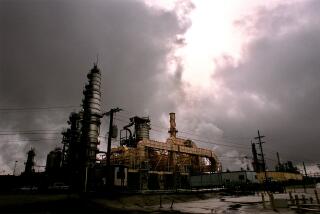CLINTON AND BUSINESS : FOREIGN LOBBY : Japanese Hoping to Get Jump on New U.S. Policy : Trade: Fearing a less-friendly Administration, companies and executives move to exert an influence in the planning stage.
WASHINGTON — As President-elect Bill Clinton and his aides draw up policies for the next four years, some Japanese companies and business executives already are gearing up for an intensive effort to influence the new Administration’s decision-making.
The head of a Tokyo-based manufacturing firm last weekend urged Japanese government and business officials to “maintain contact and influence at every possible level” with the incoming Clinton Administration.
“We should have an integral role in this ‘Clinton shift,’ ” declared Jiro Ushio, chairman of Ushio Electric Inc., which produces lamps and optical equipment, in an interview with the Japanese newspaper Sankei Shimbun.
Ushio also urged that “before the year is out . . . Japanese governmental and business groups form missions and go to America in an effort to meet Clinton and his assistants. We have little time to mobilize, because policy will be pretty much set in place during the three-month period between Clinton’s inauguration in January and sometime in April.”
He is not alone. In the days after Clinton’s election, Japan Auto Manufacturers Assn. President Yutaka Kume said that the Japanese car industry is preparing for severe new pressures.
Minoru Makihara of Mitsubishi was quoted as saying that he is worried about new trade frictions. Japanese executives are particularly concerned that the new Administration may restrict Japanese exports to the United States in retaliation for Japan’s restrictions on American goods there.
Japan’s trade surplus with the United States is projected to grow to an estimated $52 billion this year, much greater than the American imbalance with any other nation.
Japanese companies have huge stakes in Clinton’s policies. They will be affected by changes in trade policies, by any Clinton effort to adopt an industrial policy in which the U.S. government aids American companies, by a planned drive to collect more U.S. taxes from foreign firms and by attempts to tighten the rules governing lobbyists for foreign interests.
“The Japanese Establishment is going to make an extraordinary effort to keep in place the Bush trade and economic policies toward Japan,” predicted Pat Choate, author of the controversial book, “Agents of Influence.”
In general, the Bush Administration has not been as tough with Japan in its trade policies as Democrats in Congress would like. Japan has long had much greater access to U.S. markets than American firms have had in that country.
Choate said that Japanese firms are “betting they can have enough lobbyists, enough influence with Americans depending on Japanese suppliers or goods and that the people around Clinton are unsophisticated enough that they can get their spin in early.”
Japanese attempts to influence Washington, particularly on trade and economic policy, were a recurrent issue in this year’s presidential campaign.
Pat Buchanan, President Bush’s challenger for the Republican nomination, independent candidate Ross Perot and Democratic candidate Tom Harkin all criticized the role played by Japanese lobbyists in the Bush campaign.
By contrast, Clinton generally kept the issue at arm’s length. In particular, he avoided singling out Japan or Japanese lobbyists for criticism. For example, Clinton repeatedly complained that foreign companies are not paying their fair share of U.S. taxes, but he refrained from targeting the attack exclusively at Japanese firms.
Last month, during the final presidential debate, Perot claimed that “our country has sold out to foreign lobbyists. One country, Japan, spent $400 million lobbying in 1988.”
Clinton responded that “I think Ross is right, that we do need some more restrictions on lobbyists,” but again avoiding any direct reference to Japan.
Despite Clinton’s relatively even-handed approach toward Japan during the campaign, Ushio, in the newspaper interview, expressed fear that the new Democratic Administration will have tougher policies toward Tokyo and Japanese companies--in part because of the constituencies in the Clinton camp.
“There is a fundamental shift in America which seeks to emphasize economic power,” the Japanese executive asserted. “I am also concerned that Silicon Valley and other high-tech areas came out in strong support of Clinton. . . .
“It is important to keep in mind that during this formulative period of choosing the U.S. Cabinet and new Administration officials, new policies will also take form. Therefore, Japan must latch on and be involved in this formulation stage and have input in the design of the project before construction begins,” Ushio said.
A few Japanese officials have taken a more hopeful view, saying privately that they hope trade pressures may ease with a Democrat as President.
They argue that in the past, the Democratic Congress used trade bills to embarrass a Republican President but, with Clinton in the White House, Congress will no longer have any political interest in doing so.
Some analysts believe that Japan’s worries about future U.S. policies have been heightened by the Bush Administration’s post-election willingness to risk a trade war with Europe.
More to Read
Inside the business of entertainment
The Wide Shot brings you news, analysis and insights on everything from streaming wars to production — and what it all means for the future.
You may occasionally receive promotional content from the Los Angeles Times.










